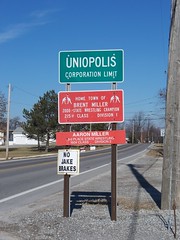Conservatives love Small Town America™. They extol its virtues all the time. Too bad conservative economics is wiping Small Town America™ off the map.
Move over ! Two years ago, I wrote that Colorado Springs was a conservative "Utopia," for its rejection of tax increases, which led the city to lay off firefighters and police officers, stop paving roads, eliminate evening and weekend bus service, reduce garbage service, turn off streetlights, and asked residents to mow the grass in public parks (light work, since the city's water cutbacks ensured most grass in most parks would be dead). Tent cities began springing up as the city cut social services.
David Sirota called it conservatism's real "shining city on the hill."
This is what Reaganites have always meant when they’ve talked of a “shining city on a hill.” They envision a dystopia whose anti-tax fires incinerate social fabric faster than James Dobson can say “family values”—a place like Colorado Springs that is starting to reek of economic death.
But that was so two-years-ago. Move over, Colorado Springs! Youngtown, Arizona has totally got you beat.
In Youngtown, Ariz., city officials are contemplating the legal equivalent of shutting down.The city of about 6,500 people 30 minutes northwest of Phoenix is, for all practical purposes, a small-government, low-taxes, no-compromise kind of place. Youngtown sold its water authority to a private company nearly two decades ago. It's been nearly three years since city crews, instead of private contractors, mowed the lawn outside town hall. And trash pick-up has never been a city-run operation.
Youngtown was founded almost 50 years ago as the nation’s first all-senior citizen city, where part of the attraction was the absence of a property tax. A 1998 court order forced Youngtown to welcome younger residents. But as the city expanded its police force and other services to meet its changing needs, it never instituted a property tax, the single most important revenue ingredient in most municipal budgets.
Now, faced with a $183,000 deficit that will force the city to drain more than 10 percent of its rainy day fund, officials are considering everything from the historic to the nearly unthinkable, The Arizona Republic reported Tuesday.
Youngtown officials are considering which of the few remaining city services to cut. They're discussing levying a property tax for the first time in history. And they're exploring allowing the city to be annexed by a nearby municipality or simply giving up Youngtown’s status as a city and becoming an unincorporated piece of the surrounding county.
OK. It's not quite like Youngtown is going to become a ghost town, but the officials are literally willing to wipe Youngtown off the map rather than levy taxes. The funny part of the article is when Mayor Michael LeVault says the city government is avoiding "the ostrich option" — "You know, stick your head in the sand and let the next guy deal with it." Um, isn't being annexed by a nearby city or becoming an unincorporated part of the surrounding county letting "the next guy deal with it"? Wouldn't Youngstown's problems then become someone else's?
In a sense, Youngtown is the product of conservative policies. The article says that "[I]t can no longer depend on the state and federal governments to round out its balance sheet." That's probably party due to conservative shenanigans like the debt ceiling debacle, which set in motion "extraordinary measures" at Treasury, leading to headaches for cash-strapped cities and states. Austerity's impact on job loss has hit cities and states the hardest, as loss of government jobs increaswa states' unemployment numbers. (According to EPI's David Cooper, government job losses accounted for 100% of job losses in 27 states, including Arizona. Meanwhile Washington doesn't do much about it, as conservatives spend their time cutting school lunches and holding hearings on radical Islam instead of passing bills like the American Jobs Act, with its $35 billion to help state and local governments save 400,000 jobs by rehiring or retaining teachers, firefighters, police officers and first responders.
Republican governors and legislators across the country did their part, pushing through radical right-wing agendas state by state. The budget deadlock between Gov. Mark Dayton and Republicans in the state legislature cost Minnesota alone $23 million a week. Republicans in the legislature pushed the state into shutdown due to their insistence on remedying the state's budget shortfall with drastic cuts to government services, and their refusal to increase taxes. Extreme agendas led to budget cuts and job losses in states like Wisconsin, Ohio, Florida, and Michigan.
Speaking of Ohio, Youngtown is not alone. Uniopolis, Ohio is also on the verge of extinction.
This small village of low-slung houses and squeaky swing sets in western Ohio's farm country has already laid off its part-time police officer and decided not to replace its maintenance worker, who recently retired. To save cash, Mayor William Rolston will propose Monday that the town turn off the street lights, and that Uniopolis disincorporate after more than a century in existence."We've decided that with the budget cuts, we just can't do it anymore," said Rolston, the mayor of 19 years, speaking from the town's one-room municipal building, its wallpaper covered with heart-shaped American flags. "About the only thing that can save it now is an act of God."
As local governments grapple with the aftermath of a brutal recession, communities across Ohio and the nation have cut back on spending. Voters elected politicians who pledged to balance budgets, but now that the effects are being felt, some are changing their minds.
They ultimately will have to answer this question: Is balancing a budget in hard times a necessity, as House SpeakerJohn A. Boehner, whose district is just down the road, has said, or is cutting to the bone right now just too much to ask of a small town?
We already know John Boehner's answer to that: "So be it."



